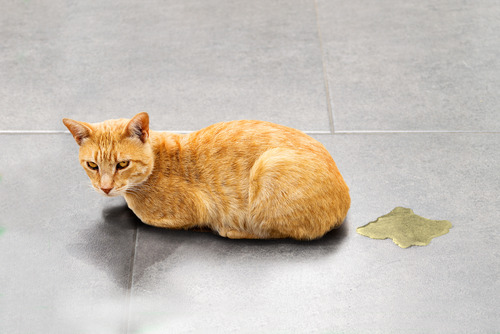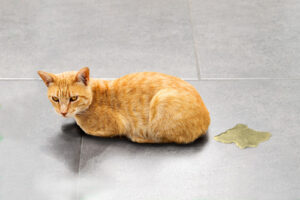As a cat owner, discovering that your cat is peeing everywhere can be frustrating and concerning. It’s essential to understand the reasons behind this behavior and take appropriate action to address it. In this blog, we’ll explore the potential causes of why your cat is peeing everywhere and what you can do about it. If you find yourself dealing with this issue, contact Harlingen Veterinary Clinic in Belle Mead, New Jersey, at (908) 359-2000 or make an appointment online for professional assistance.
Understanding the Causes of Inappropriate Urination
Cats are generally clean animals, so when they start urinating outside their litter box, it’s usually a sign that something is wrong. Understanding the root causes can help you address the issue effectively.
Medical Issues
One of the first steps to take when your cat is peeing everywhere is to rule out any medical problems. Several health issues can lead to inappropriate urination in cats.
- Urinary Tract Infections (UTIs): UTIs are a common cause of inappropriate urination. If your cat has a UTI, they may experience pain while urinating, leading them to associate the litter box with discomfort and avoid it.
- Bladder Stones: Bladder stones can cause irritation and blockages in your cat’s urinary tract, making it difficult and painful for them to urinate. This condition requires immediate veterinary attention.
- Kidney Disease: Kidney disease can lead to increased thirst and urination, which might result in accidents outside the litter box. It’s crucial to diagnose and manage this condition promptly.
- Diabetes: Diabetes in cats can cause excessive urination and increased water intake, leading to accidents. Proper diagnosis and treatment are essential to manage this condition.
Behavioral Issues
If your cat is healthy but still peeing everywhere, behavioral issues might be the culprit. Cats are sensitive creatures, and changes in their environment or routine can lead to stress and anxiety, causing them to urinate outside the litter box.
- Stress and Anxiety: Changes in your household, such as moving, new pets, or new family members, can cause stress and anxiety in cats. This stress can manifest as inappropriate urination.
- Territorial Marking: Cats may urinate outside the litter box to mark their territory, especially in multi-cat households. This behavior is more common in unneutered males but can occur in any cat.
- Litter Box Preferences: Some cats are particular about their litter boxes. They might dislike the type of litter, the location of the box, or the cleanliness of the box. Ensuring the litter box meets your cat’s preferences can prevent accidents.
Addressing Medical Causes
If you suspect a medical issue is causing your cat to pee everywhere, it’s essential to visit your veterinarian. A thorough examination and diagnostic tests can help identify the underlying problem.
Veterinary Examination and Diagnosis
Your veterinarian will conduct a physical examination and may recommend tests such as urinalysis, blood tests, and imaging studies. These tests can identify infections, stones, or other health issues causing inappropriate urination.
Treatment Options
Depending on the diagnosis, your veterinarian will recommend appropriate treatments. Antibiotics can treat UTIs, while dietary changes and medication can manage conditions like bladder stones and kidney disease. For diabetes, insulin therapy and a special diet may be necessary.
Managing Behavioral Issues
If medical issues have been ruled out, addressing behavioral causes is the next step. Here are some strategies to help manage your cat’s behavior.
Reducing Stress and Anxiety
Creating a calm and stable environment is crucial for reducing your cat’s stress levels. Here are some tips to help your cat feel more secure:
- Ensure your cat has a quiet, comfortable place where they can retreat when feeling stressed. This could be a separate room or a cozy nook in your home.
- Pheromone diffusers can help calm your cat by releasing synthetic versions of the calming pheromones cats naturally produce. These diffusers can reduce stress and prevent inappropriate urination.
- Cats thrive on routine, so try to keep feeding times, playtimes, and other daily activities consistent. This predictability can help reduce anxiety.
Addressing Territorial Marking
If territorial marking is the issue, consider the following strategies to reduce this behavior:
- Spaying or neutering can significantly reduce territorial marking behaviors, especially in males.
- If your cat is marking in specific areas, try to limit their access to these spots. Clean marked areas thoroughly with an enzymatic cleaner to remove the scent and discourage further marking.
- In multi-cat households, ensure there are enough litter boxes for each cat. A general rule is to have one litter box per cat plus an extra one. Place them in different locations to reduce territorial disputes.
Ensuring Litter Box Satisfaction
Cats can be particular about their litter boxes. Ensuring your cat is happy with their litter box setup can prevent accidents.
Litter Box Placement
Place the litter box in a quiet, easily accessible location. Avoid placing it near loud appliances or in high-traffic areas. Cats prefer a peaceful place to do their business.
Litter Box Type and Litter
Experiment with different types of litter and litter boxes to find what your cat prefers. Some cats like covered boxes, while others prefer open ones. Similarly, some cats have preferences for certain types of litter, such as clumping or non-clumping.
Cleanliness
Keep the litter box clean by scooping it daily and changing the litter regularly. Cats are clean animals and may avoid using a dirty litter box.
Creating a Positive Environment
Creating a positive environment for your cat can prevent stress-related urination issues. Engage with your cat regularly to keep them happy and content. Provide plenty of toys and opportunities for play to keep your cat mentally and physically stimulated. Regular play sessions can reduce stress and anxiety, leading to fewer accidents.
Positive Reinforcement
Use positive reinforcement to encourage good behavior. Reward your cat with treats and affection when they use the litter box correctly. Avoid punishment, as it can increase stress and worsen the problem.
Contact Harlingen Veterinary Clinic for Help
Understanding why your cat is peeing everywhere and addressing the root causes is crucial for resolving this issue. If you’ve tried these strategies and your cat is still peeing everywhere, it’s time to seek professional help. Harlingen Veterinary Clinic in Belle Mead, New Jersey, has experienced veterinarians who can help diagnose and treat the underlying causes of inappropriate urination. Call us at (908) 359-2000 or make an appointment online to get the help your cat needs.






